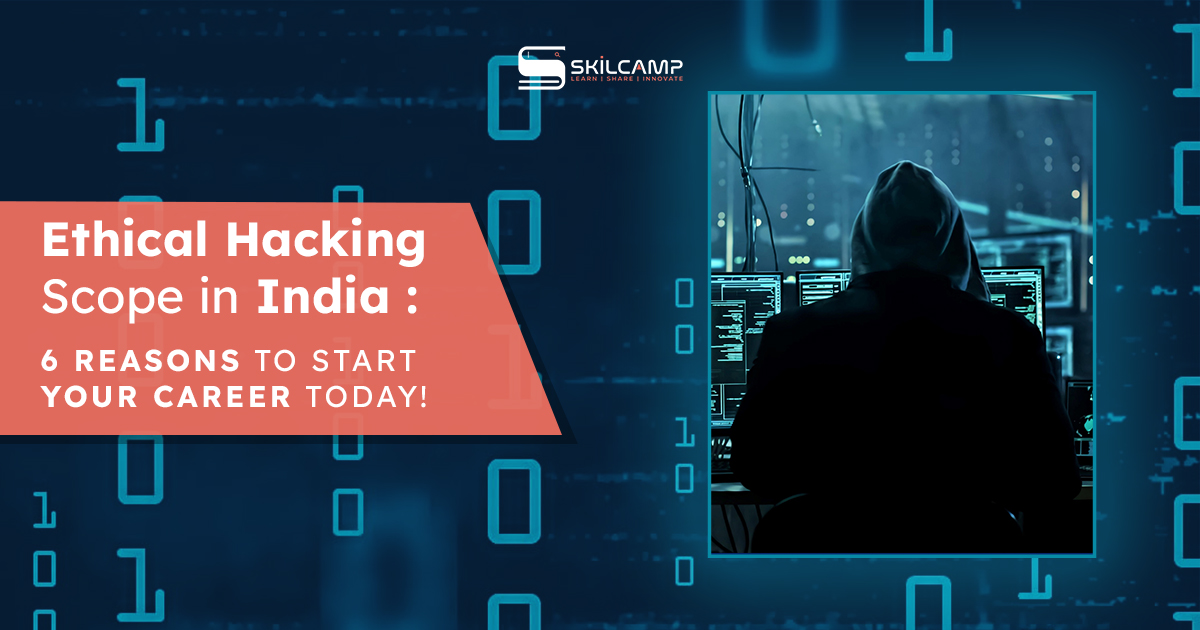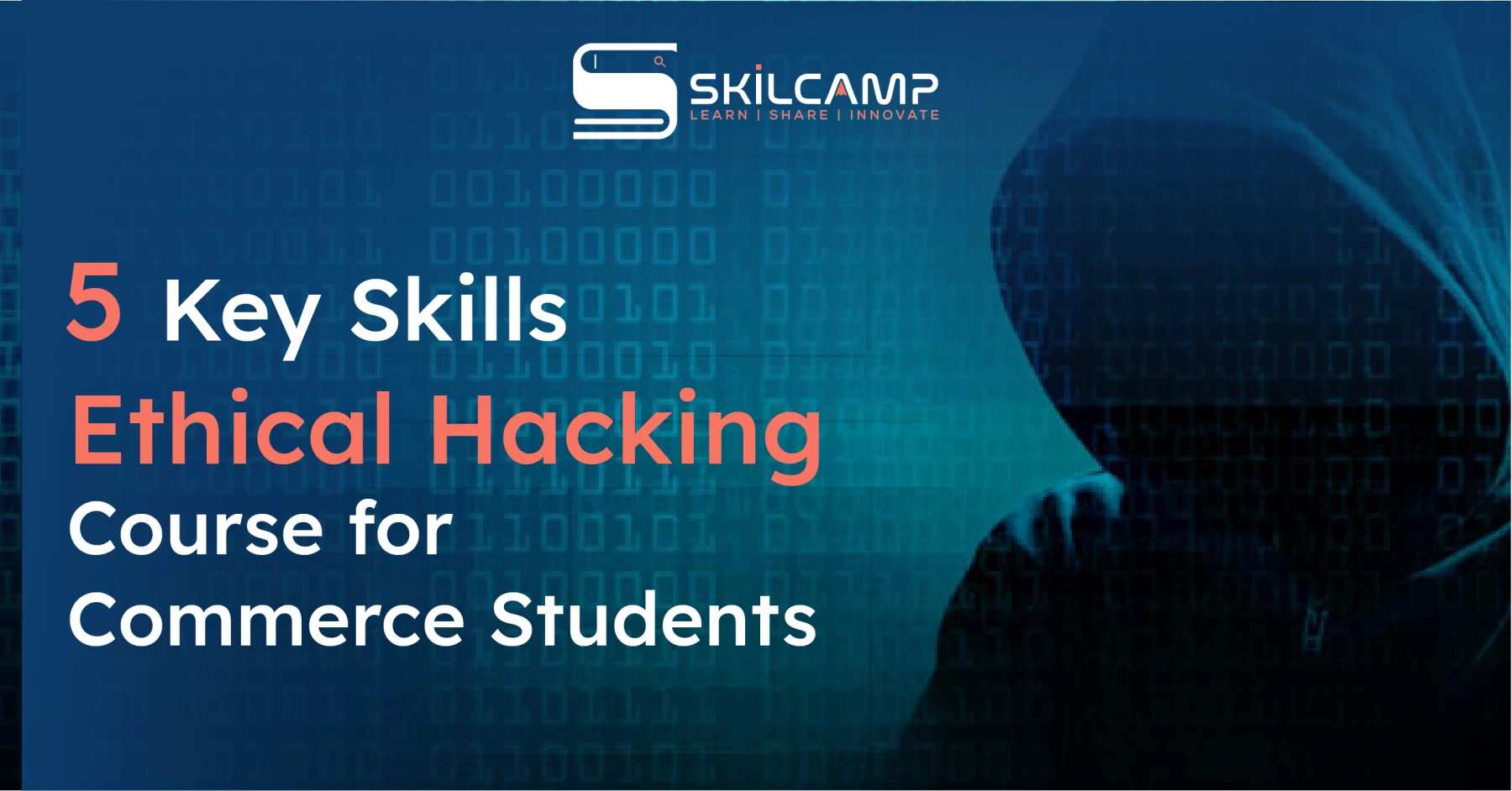Table of Contents
Cybersecurity is of paramount importance in today’s technologically advanced society. White-hat or ethical hacking, is an increasingly important area of computer security. Further in this post, we’ll look at the ethical hacking scope in India and provide six strong arguments for why now is a great time to enter this industry.
Ethical hacking is the technique of legally breaking into computer systems, networks, and software programs with the intention of finding flaws and security holes. Ethical hacking, in contrast to malevolent hacking, is performed with the owner’s consent and seeks to improve security by proactively addressing possible vulnerabilities.
The rise of the ethical hacking scope in India illustrates how the necessity for effective cybersecurity solutions has skyrocketed in response to the widespread use of more complex digital infrastructures. As a result, experts in the discipline of ethical hacking have emerged to help identify security flaws and devise solutions. Cyber security, cyber defense, and digital system integrity are all areas in which ethical hackers play a key role.
The Need For Ethical Hackers in India
The need for ethical hackers is high in India because of the country’s prominence in the IT industry worldwide. As you see in the image, the demand for cybersecurity experts has increased exponentially throughout the years in varied industries. Some of the main ethical hacking scope in India are as follows:
– IT industries
India’s IT industry is booming, and the country has many businesses and institutions that depend significantly on the Internet. There are greater opportunities for harm as technology develops. Finding and fixing these security flaws is why ethical hackers are so important for keeping sensitive information safe from prying eyes.
-Cloud computing
Data storage and processing have moved to distant servers as a result of the growing use of cloud computing. Cloud computing has many advantages, but it also raises some new security concerns. Ethical Hacking Scope in India plays a crucial role in assessing cloud security, finding vulnerabilities, and applying effective countermeasures to secure sensitive information.
– A lot of companies are migrating to India
India has become an appealing location for many global corporations, particularly those in the information technology (IT) industry but also those in other sectors. Companies with a presence or plans to develop in India need the services of ethical hackers to protect their data and prevent hacking attempts.
– India’s IT-related startups
Startups in India’s information technology (IT) scene have exploded in recent years, with many new companies springing up in areas including e-commerce, finance, health tech, and more. Cybercriminals see startups as juicy targets because they manage sensitive consumer information and financial data. When it comes to protecting user data and bolstering these firms’ security measures, ethical hackers are essential.
– Data security is paramount
The need for keeping information safe is paramount: Information security is of important relevance in today’s data-driven society. The loss or exposure of sensitive data, whether it be personal information or trade secrets, may have dire implications. By doing security audits, vulnerability assessments, and penetration testing, ethical hackers help ensure that critical data is protected from unauthorized access. Ethical hacking scope in India encompasses various roles and responsibilities within the realm of cybersecurity, contributing to the protection of sensitive information on a national scale.
Recommended reading : In-demand ethical hacking skills
6 Reasons To Start Learning Ethical Hacking in India
1. Understand hacker’s mindset to predict and prevent disasters
Ethical hacking education provides a window into the methods and thought processes of cyber criminals. With this information in hand, you can put yourself in the shoes of a hacker, foresee their methods, and take precautions in advance. Being able to see things through a hacker’s eyes is essential for patching up security flaws and preventing future catastrophes in our digital infrastructure.
2. Opportunity to work in a global environment
Potential for international employment due to the in-demand nature of ethical hacking skills. Beginning an ethical hacking profession in India may lead to intriguing chances both domestically and outside. Professionals with knowledge of ethical Hacking Scope in India are in high demand as companies all over the globe recognize the importance of cybersecurity.
3. Assure quality standards and optimized security
Ethical hackers are essential to ensuring quality standards are met and security measures are optimised. They make sure that digital systems are secure by finding flaws, performing penetration tests, and putting in place adequate security policies. Knowledge of ethical hacking aids businesses in preserving the security of their systems and gaining the trust of their constituents.
4. In-demand and trending skill
Professionals with the expertise to protect digital systems are in high demand as the security environment continues to shift. Ethical hacking is a growing field, and those who master it quickly and have ethical hacking eligibility have a competitive advantage in the employment market.
5. Always good to learn even from a different background like digital marketing or analytics
Professionals in fields like IT, digital marketing, and analytics may all benefit from learning ethical hacking techniques. Regardless of your present industry, expanding your knowledge to include ethical hacking is sure to set you apart. It will help you become a more well-rounded professional by improving your problem-solving skills, critical thinking, and knowledge of cybersecurity.
6. No ethical hacking eligibility is required for a self-paced course.
There are no strict prerequisites for self-paced courses in ethical hacking, which is a significant perk of studying in India. A self-paced ethical hacking course is available to anybody with an interest in cybersecurity and a willingness to learn. Because of this, people from various walks of life are able to join the area of ethical hacking and make important contributions to the evolution of the cybersecurity industry.
Recommended Course: Ethical Hacking Course
Hacking and Ethical Hacking: What’s the Difference?
When it comes to cyber security, hacking, and ethical hacking are two separate practices with opposite goals. A closer comparison reveals the difference between hacking and ethical hacking-
– Legal
In the eyes of the law, “hacking” is any act of maliciously gaining access to computer systems, networks, or software applications. As it may lead to illicit acts like data theft, fraud, or interruption of services, it is both immoral and illegal. Criminal penalties for hacking range from fines to jail time.
– To protect company data
When testing a system ethically, however, the owner’s approval and authorization are required. White-hat hackers are ethical computer security professionals who conduct vulnerability assessments within the law and in accordance with professional standards of conduct. Their goal is to make things safer, more secure, and less vulnerable to intrusion. Ethical hacking is a legal and approved method used to strengthen an organization’s existing cybersecurity protocols.
– To enhance the company’s security
Data security is important because hackers use illegal means to obtain private information for either nefarious or self-serving ends. Companies are at serious danger of having sensitive information stolen, experiencing financial losses, and having their reputations harmed as a result of this. In this setting, hacking is a serious betrayal of trust and may have disastrous effects on companies.
– To build robust systems
However, businesses hire or contract ethical hackers to assess their systems and networks for security flaws. To gauge the state of the company’s security, they undertake authorized penetration testing and vulnerability assessments. The goal is to find vulnerabilities before criminals can take advantage of them, safeguarding sensitive firm information from intrusion.
Conclusion
In sum, after reviewing the state of cybersecurity in India, we can conclude that ethical hacking is a viable career option. Individuals may succeed in this in-demand industry by safeguarding firm data and establishing security systems via a grasp of the hacker’s perspective, working in a global context, ensuring quality standards, and adjusting to varied backgrounds.
FAQs
In India, what educational prerequisites are needed to enter the field of ethical hacking?
A bachelor’s or master’s degree in cybersecurity, computer science, or a similar discipline may be helpful for those seeking to enter the profession of ethical hacking in India. However, no formal requirements have been laid down.
Do you need a degree to become an ethical hacker, or can you learn the skills you need on your own?
While a traditional education may provide a solid foundation, ethical hacking abilities can also be taught independently by reading, watching videos, and doing other forms of self-directed study. Extensive education is also available via independent study and professional accreditation. To stay up with rapidly developing technology and new risks, it is crucial to put what is learned into practice and to keep learning.
For how long must one practice before reaching competence as an ethical hacker?
The time it takes to become a skilled ethical hacker varies from person to person and is influenced by factors such as motivation, background knowledge, and access to training materials. Learning and doing might be ongoing for a few months to a few years.




Leave a Reply